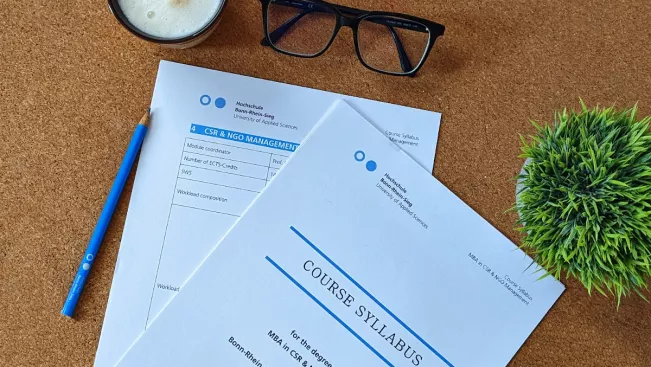CSR & NGO Management (MBA) - discontinued
Examinations and teaching formats

Teaching methods used in the MBA Program:
- Presentations and guest lectures
- Individual exercises and group work
- Field trips and excursions
- Flipped classroom
- Online quizzes and assessment
- Online lectures and workshops
- E-Learning components
- Discussion- and scenario-based learning
- Interactive teaching discussions
- Business simulations
- Business plan development (as a paper group work project)
- Oral single and team presentations in class
- Practical exercises and case studies
- Individual and group coaching sessions
Guest speakers
Lecturers also share their own practical experiences and invite renowned guest speakers to build a constructive environment and give students an in-depth, hands-on learning and networking experience with business experts.
The flipped classroom concept
The idea is that students are expected to read the material before class and critically analyze it. Questions are provided to help a student reflect and then bring their thoughts to the class. Circulating hand-outs on the e-learning platform LEA prior to a lecture are offered prior in advance, especially if the hand-out is being used or discussed in class.
Business Plan Development
The MBA students are expected to prepare the Business Plan Development paper collaboratively in a team. Considering that students come from different educational and professional backgrounds and most have substantial work experience, team assignments help them learn from each other and from sources like the faculty, texts, books, articles, and practical cases. Graduates can exchange their skills with specialists and outsiders alike.
Case Studies
The MBA program uses many case studies with a focus on CSR and NGOs. Students are introduced to real situations and receive some background info on the organization and its operating environment. They are then expected to identify the key issues, evaluate options, make a reasonable decision, recommend a clear plan of action, and defend their position.
Peer-to-peer learning
Many of our lecture formats allow room for discussion and exchange. This, in turn, allows students to develop formal and informal professional communication skills. They learn interdisciplinary thinking through focused work in intercultural groups. Presentations, group discussions, teamwork, and individual projects test and improve the student’s communication skills. The interaction among the group members gives them a chance to understand other’s points of view, the different ways of thinking, and consideration of diverse experiences. Each member should make it a point to actively be involved in the discussions while presenting the final outcome.
Further teaching methods
In addition to the case study method, instructors use and combine other teaching methods, such as role-playing, field trips, guest speakers, interactive discussions, lectures, oral presentations, simulations, research projects, pitch sessions, online class surveys, quizzes, and live-polls (by the help of web tools and mobile apps) and business plan workshops.
Examination types in the MBA Program
The forms of examinations integrated into the MBA program essentially comprise four examination formats: written on-site examinations, seminar papers, oral examinations (in the form of individual or group presentations) and business simulations by using professional project planning software. In the following, the different forms of examinations are described in more detail.
Written exams
MBA Students who want to take a written exam have to register in advance, within the announced examination registration period. Depending on the module topic, the exam questions mainly consist of questions on the lecture content that is to be answered in essay form, others however, expect the students to calculate by using mathematical formulas and finally interpreting their results.
Seminar/Term papers
MBA Students explore a topic by reviewing the literature on a specific research question in the field of the respective module seminar. Each student must prepare an individual seminar paper (approximately 20 pages) on an allocated topic, given by the lecturer. Therefore, students have a time window of six weeks and must comply strictly with the university academic writing guidelines.

Overview on the exam types in the MBA Program:
- Written exams (mostly essays)
- Academic papers (concept papers, assignments, essay papers)
- Business plans (as a group work project)
- Oral presentations (e.g. in elective classes)
- Internship reports*
- Master’s thesis
* Students who entered the MBA program with less than 210 ECTS credits.
Links
Further links

